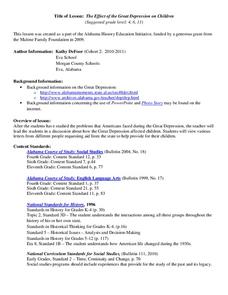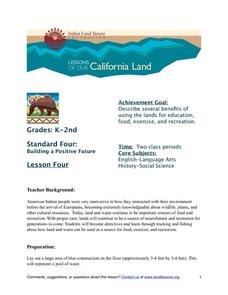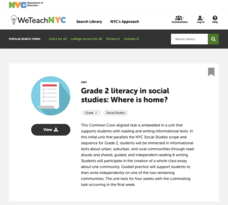Museum of Tolerance
Family Role Model Activity
What does is take to be a role model? Through grand conversation, and the use of books and a graphic organizer, scholars find out and apply the requirements to identify a role model within their family. They then journey through the...
Curated OER
Patriotic Symbols of the United States
Young historians take a close look at the most famous patriotic symbols of the United States and determine what they actually stand for. Symbols such as Uncle Sam, The Statue of Liberty, The Bald Eagle, and The Liberty Bell are studied....
American Institute of Architects
Architecture: It's Elementary!—Fifth Grade
Young citizens construct an understanding of urban planning in this cross-curricular unit. Covering every aspect of city development from the political, economic, and social influences to sustainable building practices, this 10-lesson...
Curated OER
Exploring Owls
What can young scientists discover from dissecting an owl pellet? Explore the owl food chain, beginning with an introduction to these predatory birds. Suggested strategies here include creating a podcast and purchasing a poster, however...
Illinois Department of Natural Resources
Section One: What is Biodiversity?
Four intriguing and scientific activities invite learners to explore the natural resources of their town. The activities cover concepts such as genetic traits, organizing species in a taxonomy, the differences between different species...
Channel Islands Film
Island Rotation: Lesson Plan 1
How do scientists provide evidence to support the theories they put forth? What clues do they put together to create these theories? After watching West of the West's documentary Island Rotation class members engage in a series of...
Scholastic
Ruby Bridges: A Simple Act of Courage, Grades K-2
A civil rights movement lesson plan designed specifically with the Common Core State Standards in mind, young learners are introduced to the story of Ruby Bridges as the first African American child to attend an all-white elementary...
Alabama Department of Archives and History
The Effect of the Great Depression on Children
How did the Great Depression affect children? Sometimes studying the Great Depression means only studying about how it affected adults, however, relating the experiences of children and peers their age to themselves may make the...
Indian Land Tenure Foundation
Gifts from Land and Water
With a series of fun hands-on simulations, young children can learn about conservation and natural resources. Your learners become land detectives, discussing and investigating the gifts that the land and water provide them. They then...
New York City Department of Education
Geography and Early Peoples of the Western Hemisphere
Young historians discover the early people of the western hemisphere. The unit explores how the land changed, how it was used and homes of early Americans such as Incas, Mayans, Inuits, Aztecs, and Pueblos. Individuals also examine these...
New Jersey Historical Commission and New Jersey Council for the Humanities
Thomas Edison: The Wizard of Menlo Park
What would change in your daily life due to a power outage? Here, learners explore the inventions brought to us by the one and only, Thomas Edison, and imagine a day without them. Scholars take part in a grand conversation and write a...
New York City Department of Education
Dance and Text
Use texts and dances to teach inequalities and equations. A sixth-grade unit covers using variables in equations and inequalities to solve problems. Learners show what they know at the end of the unit using two performance tasks, one...
New York City Department of Education
Chris’ Garden Dilemma
Make the connections between area, tiling, and multiplication. A performance task and associated unit presents the concept of area and makes the connection to multiplication. Pupils work through three major sections of instruction that...
New York City Department of Education
Grade 2 Literacy in Social Studies: Where Is Home?
What makes a community? How communities differ? Young scholars research different types of communities, small rural towns, and large crowded cities. They respond to writing prompts, and write essays in groups to understand the wide...
Kate Stickley
Reading the World: Latitude and Longitude Lesson latitude and longitude, maps, coordinates on a map, prime meridian, reading maps, equator, globes
Find five activities all about longitude and latitude! Use oranges to show the equator and prime meridian, plot birthdays on a map using coordinates, and plan a dream vacation.
Curated OER
The Heart of the Matter
Upper elementary pupils learn about the blood transportation system and anatomy of the human heart. They fill in an outline of the human heart (not included) focusing on the flow of blood to and from the heart. Using stethoscopes, they...
Curated OER
Where Has It Been? Tracking the Ivory-Billed Woodpecker
By studying the assumed extinction, and subsequent rediscovery of the Ivory-billed Woodpecker, learners use maps and come up with a scenario for the rediscovery of the bird. This incredibly thorough lesson plan is chock-full of...
Alabama Learning Exchange
Systems Every "Body" Needs to Know
Through an informative WebQuest and group work, learners explore the human body and cell structure. They create a cell diagram, research a disease, write a letter explaining the causes of human disease, and work in small groups to create...
Japan Society
Tanabata: Japan's Star Festival
The Star Festival or Tanbata, is a holiday celebrated in Japan every year. People make tanzakus out of paper and hang them on the trees. Pupils will learn about this culturally significant holiday while creating tanzakus of their own....
Other popular searches
- English Language Arts Exam
- English Language Arts Games
- Deaf English Language Arts
- English Language Arts Music
- English Language Arts Heroes
- English Language Arts Skills
- Language Arts English
- English Language Arts Grade 3
- English Language Arts Poetry
- English Language Arts Rating=3
- English Language Arts Unit Sc
- Language Arts or English




















